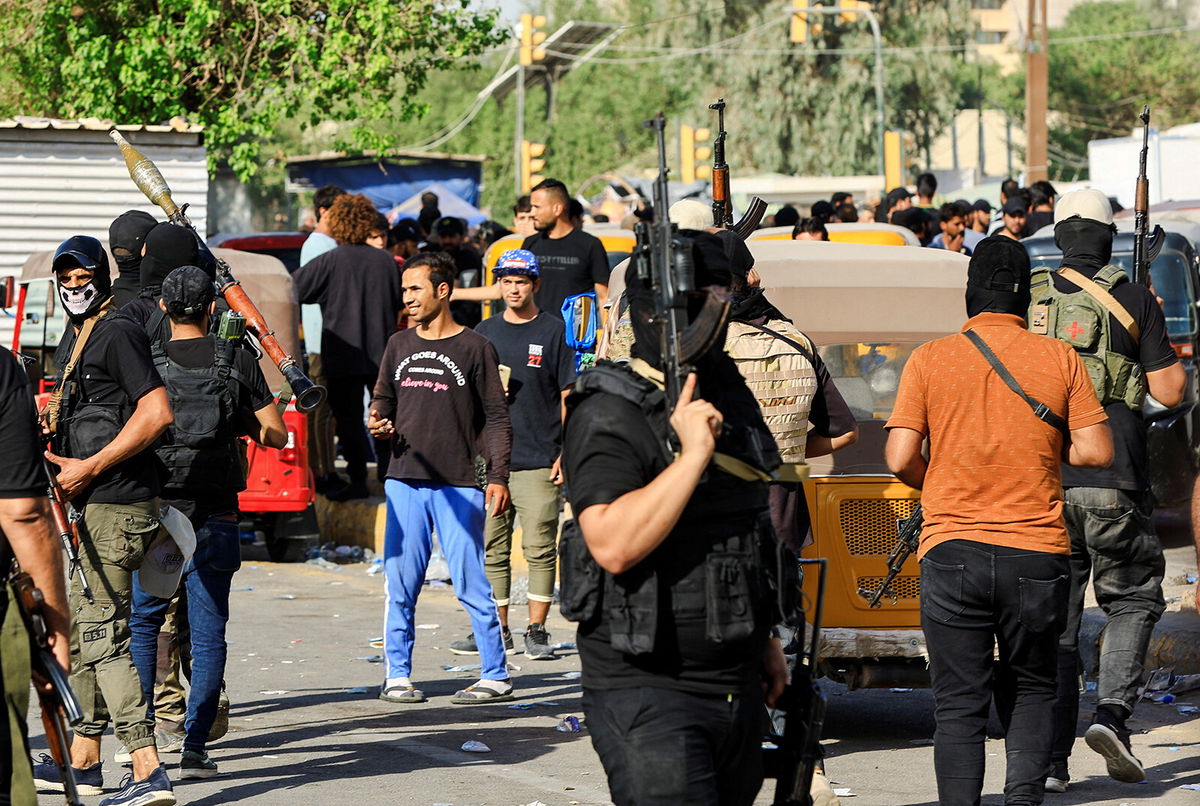Powerful Iraqi cleric tells supporters to stand down after day of deadly violence in Baghdad

Powerful Iraqi Shia cleric Muqtada al-Sadr ordered his supporters to go home on August 30
By Aqeel Najim, Mostafa Salem, Mohammed Tawfeeq, Eyad Kourdi and Ivana Kottasová, CNN
Powerful Iraqi Shia cleric Muqtada al-Sadr ordered his supporters to go home on Tuesday, 24 hours after his announcement of withdrawal from politics prompted his loyalists to rampage through the capital’s streets in a show of force.
At least 21 people were killed and more than 250 injured in clashes that erupted after al-Sadr announced his “final retirement” from politics Monday and said he was closing down his political offices across the country.
His backers subsequently stormed the capital’s heavily fortified Green Zone and the Republican Palace, where the cabinet meets. Protesters were seen swimming in the palace’s pool and waving Iraqi flags, while others clashed with Iraqi security forces in what turned out to be some of the deadliest violence seen in Baghdad in years.
On Tuesday, al-Sadr apologized to the Iraqi people and ordered his supporters to withdraw from the Green Zone, giving them an ultimatum.
“If [protesters] do not withdraw, including from parliament, within 60 minutes I will disavow the movement itself,” he said during a press conference in the holy city of Najaf.
Senior Iraqi officials including the outgoing Prime Minister Mustafa al-Kadhimi had urged al-Sadr to call on his supporters to withdraw from the Green Zone. In his address, al-Sadr thanked government forces for “remaining neutral” during the crisis.
“I am walking, with my head bowed, and I apologize to the Iraqi people who are the only ones that have been harmed,” he said.
Security forces told CNN that protesters started to withdraw from the Green Zone immediately after al-Sadr’s speech. Videos from Baghdad showed large crowds of protesters leaving the area.
Minutes later, the Iraqi military said it would lift a nationwide curfew that was imposed on Monday. The United Nations Assistance Mission in Iraq (UNAMI) welcomed the “recent moderate declaration” by al-Sadr.
While there was relative calm in Baghdad on Tuesday following al-Sadr’s speech, the episode risks plunging the country deeper into crisis as it remains in a political vacuum. Iraq has been without a functioning government for 10 months now, with political parties stuck in a deadlock on who should lead the next cabinet.
A court session to dissolve parliament on Tuesday was delayed by Iraq’s federal court because of the protests.
Al-Sadr is immensely popular in the country and for years has positioned himself against the United States and Iran, which wields significant sway in Iraq.
In October, al-Sadr’s Shia bloc emerged as the biggest winner in elections that threatened to sideline the rival Iran-aligned Shia blocs which have long dominated the oil-rich country’s politics.
But al-Sadr’s attempts to form a government have since foundered amid opposition from rival blocs. In an apparent show of force, al-Sadr decided in June to order his entire political bloc to withdraw from parliament.
In July, the Coordination Framework, the largest Shia alliance in the Iraqi parliament, nominated Mohammed Shiya al-Sudani to lead the country — sparking a wave of protests by al-Sadr’s loyalists. The Coordination Framework is formed of various Shia groups, some of which are backed by Iran.
On Tuesday, al-Kadhimi welcomed al-Sadr’s call for his supporters to stand down, saying everyone had a “moral and national responsibility to protect Iraq’s capabilities, stop the language of political and security escalation, and initiate a quick and fruitful dialogue to resolve the crisis.”
Iran closed its borders with Iraq following the violence and canceled some flights to Baghdad, according to Iran’s state news agency IRNA. Iran’s Embassy in Baghdad also asked Iranians in Iraq to avoid traveling to the capital, as well as the cities of Kadhimiya and Samarra, IRNA added.
The-CNN-Wire
™ & © 2022 Cable News Network, Inc., a Warner Bros. Discovery Company. All rights reserved.